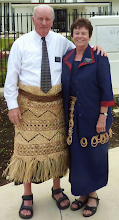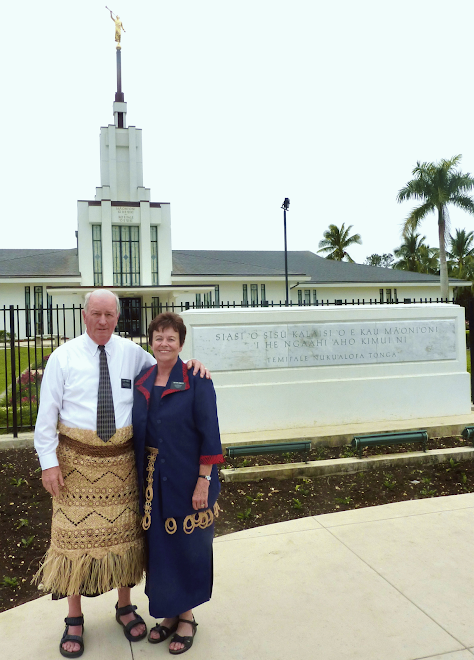At our Senior Missionary Fireside, Pres. Makemaile invited us to spend time with President Hamula of the First Quorum of the Seventy and first counselor in the Pacific Area Presidency. In a multi-stake leadership meeting, President Hamula delivered a most inspirational message, The Parable of the Great Storm, just one week before Cyclone Rene pounded the Tongan islands: [Photos of Cyclone Rene before and after]
In a multi-stake leadership meeting, President Hamula delivered a most inspirational message, The Parable of the Great Storm, just one week before Cyclone Rene pounded the Tongan islands: [Photos of Cyclone Rene before and after] THE PARABLE OF THE GREAT STORM: There is a great storm coming. It is now upon us. Many are drowning. We must lose no more. We can rescue those who are drowning. Many casualties come from those losing their way in the storm—in the dark clouds, the heavy rain, the raging winds, the floods, the earthquakes. Prophets have been called to deliver the message of how to endure the storm. In the Book of Mormon a family leaves their home, journeys through the desert, builds a ship and goes to sea; a great storm arose for certain reasons. The people in the boat were not listening to the Lord…
THE PARABLE OF THE GREAT STORM: There is a great storm coming. It is now upon us. Many are drowning. We must lose no more. We can rescue those who are drowning. Many casualties come from those losing their way in the storm—in the dark clouds, the heavy rain, the raging winds, the floods, the earthquakes. Prophets have been called to deliver the message of how to endure the storm. In the Book of Mormon a family leaves their home, journeys through the desert, builds a ship and goes to sea; a great storm arose for certain reasons. The people in the boat were not listening to the Lord…
 Our lives are like a journey across a great ocean. Our destination is the promised land beyond the ocean where we will find rest and eternal joy. On our journey we find islands that provide safety and rest until we reach our destination.
Our lives are like a journey across a great ocean. Our destination is the promised land beyond the ocean where we will find rest and eternal joy. On our journey we find islands that provide safety and rest until we reach our destination.  Our journey in boats is with those we love. As we launch into the sea the waters are calm. Then a storm approaches. The waters become turbulent, stormy, dangerous. The little boats are specks tossed round about by the strong winds, the heavy rain, the lightning and thunder, the large waves. The little boats are broken up, tipped over, throwing occupants into the water. The people are afraid and hold onto lifeboats, praying for rescue.
Our journey in boats is with those we love. As we launch into the sea the waters are calm. Then a storm approaches. The waters become turbulent, stormy, dangerous. The little boats are specks tossed round about by the strong winds, the heavy rain, the lightning and thunder, the large waves. The little boats are broken up, tipped over, throwing occupants into the water. The people are afraid and hold onto lifeboats, praying for rescue.  On shore there are people looking for those in danger. Who will get in the boats and go to rescue? Some stand by a boat unused and ready for those to go into the sea. Who will man the lifeboats and go to the rescue? Amidst the storms of life, danger lurks. Who will man the lifeboats and go to the rescue? There are stormy seas, the storm is upon us; who is willing to leave behind the comforts of home and family? Who will get into the boats and go to rescue?
On shore there are people looking for those in danger. Who will get in the boats and go to rescue? Some stand by a boat unused and ready for those to go into the sea. Who will man the lifeboats and go to the rescue? Amidst the storms of life, danger lurks. Who will man the lifeboats and go to the rescue? There are stormy seas, the storm is upon us; who is willing to leave behind the comforts of home and family? Who will get into the boats and go to rescue? 
 What has President Thomas S. Monson taught for forty years? Why has the Lord preserved this prophet now? He has proclaimed what we must do to rescue those in distress. Lifeboats sit outside our doors unused. Who will man the lifeboats? Everyone must pull his or her oar to be effective. Equipment needed is found only in the Church of Jesus Christ of Latter Day Saints: the Plan of Salvation, priesthood ordinances, baptism, confirmation, endowments, temple sealings, and so forth. No one else has this equipment. Only through our efforts can we save lives. Who needs to be rescued? Fathers, mothers, young adults, children, the elderly, all people who are in need. We are good talking about rescue but no rescue occurs by simply talking about it. We must do something. We must push out to sea in our boats. No one can make it safely across the ocean without the ordinances of the priesthood that are found in the temple. Obedience to these Gospel principles will rescue and save. We must man the lifeboats! We must save His children!
What has President Thomas S. Monson taught for forty years? Why has the Lord preserved this prophet now? He has proclaimed what we must do to rescue those in distress. Lifeboats sit outside our doors unused. Who will man the lifeboats? Everyone must pull his or her oar to be effective. Equipment needed is found only in the Church of Jesus Christ of Latter Day Saints: the Plan of Salvation, priesthood ordinances, baptism, confirmation, endowments, temple sealings, and so forth. No one else has this equipment. Only through our efforts can we save lives. Who needs to be rescued? Fathers, mothers, young adults, children, the elderly, all people who are in need. We are good talking about rescue but no rescue occurs by simply talking about it. We must do something. We must push out to sea in our boats. No one can make it safely across the ocean without the ordinances of the priesthood that are found in the temple. Obedience to these Gospel principles will rescue and save. We must man the lifeboats! We must save His children!




































 In a multi-stake leadership meeting, President Hamula delivered a most inspirational message, The Parable of the Great Storm, just one week before Cyclone Rene pounded the Tongan islands: [Photos of Cyclone Rene before and after]
In a multi-stake leadership meeting, President Hamula delivered a most inspirational message, The Parable of the Great Storm, just one week before Cyclone Rene pounded the Tongan islands: [Photos of Cyclone Rene before and after]




























 Ferry is pushed up onto the reef by Category 3 Rene:
Ferry is pushed up onto the reef by Category 3 Rene: 
![038_thumb[2] 038_thumb[2]](https://blogger.googleusercontent.com/img/b/R29vZ2xl/AVvXsEjy0LxO7pfcvkS2Tz__PmuYyWHe6JMP6zbCT5J6FDtIQiJLUMupmXvtE7B0Z584s8IvneCcp5JI3T_Fu-Fly4TWuJoWAndC4jHFlgHBR1s9PKg-xu8kGzqLbSNjyeODcSPtLZswI_q5xWh1/?imgmax=800)

















